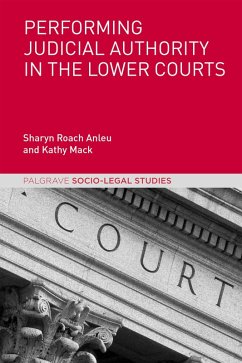The central theoretical and empirical finding presented in this book is the incomplete fit between conventional norms of judicial performance, emphasizing detachment and impersonality, and the practical, day-to-day judicial work in high volume, time-pressured lower courts. Understanding the judicial officer as the crucial link between formal abstract law, the legal institution of the court and the practical tasks of the courtroom, generates a more complete theory of judicial legitimacy which includes the manner in which judicial officers present themselves and communicate their decisions in court.
Dieser Download kann aus rechtlichen Gründen nur mit Rechnungsadresse in A, B, BG, CY, CZ, D, DK, EW, E, FIN, F, GR, HR, H, IRL, I, LT, L, LR, M, NL, PL, P, R, S, SLO, SK ausgeliefert werden.
"The book is very well written, clearly organised and remarkably free of jargon and legalise. Hence, it would be readily accessible not only to students, lawyers, researchers and judicial officers themselves, but also to general readers. ... For those of a more scholarly bent, a detailed description of the methodology is included in an appendix." (Margaret Thornton, Flinders Law Journal, Vol. 19, 2017)
"This is a very readable book that is easy to follow and digest and that adds a behind-the-scenes look at how judicial performances are crafted and performed. I wouldhighly recommend it for readers interested in a symbolic interactionist view of the courtroom performances of judicial officers. ... The book is thus aimed at a wide audience and would appeal beyond the immediate field of socio-legal studies into sociology, criminology, sociology of law, and sociology of professions." (Lisa Flower, Symbolic Interaction, 2017)









